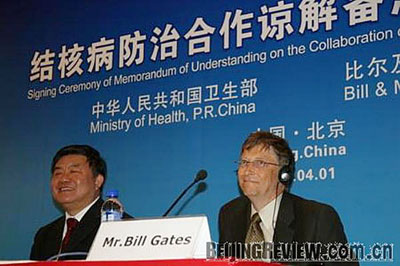|
 |
|
Bill Gates (right), founder of the Bill & Melinda Gates Foundation, and Chinese Health Minister Chen Zhu attend the signing ceremony of the Memorandum of the Understanding on the Collaboration of Tuberculosis Prevention with in Beijing, on April 1, 2009. (Sina.com) |
China's health ministry and international software tycoon Bill Gates are teaming up to improve detection and treatment of tuberculosis (TB) in the country.
China will introduce new diagnostics, new drugs, patient monitoring strategies and new approaches to help patients complete treatment by using $33 million provided by the Bill & Melinda Gates Foundation, Gates announced in Beijing on Wednesday.
Chinese health minister Chen Zhu said the project would be carried out in 20 cities in six provinces in the next five years, eventually covering 100 million people. The goal is to treat 50,000 TB patients each year.
Project plans include new diagnostic tests to improve detection of TB and fixed-dose drug combinations to reduce the number of pills a patient has to take each day by 70 percent.
Technology will also play a part. Treatment reminders will be sent out with cell phone text messages and medicine kits will have built-in reminder alarms.
The health ministry also plans on providing new incentives for health care workers, especially those in rural areas, to maintain effective follow-up of TB patients during the entire 6-8 months of treatment.
Gates made the announcement about the initiative at a World Health Organization (WHO) meeting in Beijing. In attendance were health ministers and officials from some 30 countries and regions who were discussing how to cope with the increasing threat of drug-resistant TB.
China reported 1.3 million new TB cases in 2007, including 112,000 new multi drug-resistant TB (MDR-TB) cases. The rate is the second highest in the world, after India.
About 80 percent of Chinese TB patients live in poor rural areas, Chen said.
The five-year program is aimed at helping China address the rising problem of drug resistance in TB control, said 54-year-old Gates, chairman of Microsoft Corporation.
"TB is an increasing threat because of gaps in the way the disease is diagnosed and treated," he said. "This partnership will help cut off drug resistance at its source."
The WHO blamed substandard treatment, partly caused by time-consuming diagnosis, lack of easy-to-use drugs and problems with doctors' treatment follow-up, for making TB strains increasingly resistant to drugs.
Gates stressed that innovation should be applied in worldwide TB control to develop new diagnostics, drugs, and even vaccines.
"The rise of drug-resistant TB worldwide has created a new urgency to combat the disease, while scientific innovation is leading to new technologies that will help us succeed," Gates said.
He went on to say, the most commonly used diagnostic test for TB detects only half of all cases. But by using new technology known as the LED microscope, 65 percent of cases can be detected. It also reduces the time it takes to make a diagnosis to one third of what is needed at present.
The diagnostic test for MDR-TB will require just one day for completion, compared with at least six weeks now. It will help prevent new infections.
The use of fixed-dose drug combinations can reduce 13 daily pills to just three or four, which will "make it much easier for patients to complete the treatment, cure their disease, and stop transmitting TB," Gates said.
He said China was the "perfect laboratory" for large-scale testing of new tools and delivery techniques to fight TB because of "its skill, its scale, its TB burden, its love of innovation and its political commitment to public health."
Vice Premier Li Keqiang said at the WHO meeting that TB control strategies would be incorporated within the country's health system reform which is aimed at delivering universal medical service to all 1.3 billion people.
(Xinhua News Agency April 1, 2009) | 